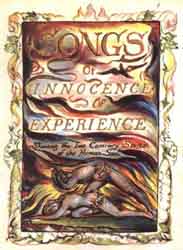
SONGS
of
Innocence
and of
Experience
Songs of innocence was etched in 1789 by William Blake.
Innocence is the state of soul in which, in these poems, is represented by the naïve outlook of the child who believes what he is told by his elders, and takes appearance for the reality and the best aspect of things for the whole truth.
But children need to grow up, and the state of innocence needs to yield to that of experience, which sees as real the world of materialism, poverty, oppression, prostitution, disease and war, epitomized in the ghastly city of modern London. Some of the individual songs of innocence have a matched counterpart of “contrary” in a terrifying song of experience; thus the meek lamb is replaced by the flaming wrathful tiger. In Blakes later writings the “contrary states” become a dialect of contraries, according to which naïve innocence must necessarily pass through and assimilate the opposing state of experience if it is to move on, by an act of imagination, to the third state, comprehending but transcending both the others, which he called “organized innocence”.
Innocence is the state of soul in which, in these poems, is represented by the naïve outlook of the child who believes what he is told by his elders, and takes appearance for the reality and the best aspect of things for the whole truth.
But children need to grow up, and the state of innocence needs to yield to that of experience, which sees as real the world of materialism, poverty, oppression, prostitution, disease and war, epitomized in the ghastly city of modern London. Some of the individual songs of innocence have a matched counterpart of “contrary” in a terrifying song of experience; thus the meek lamb is replaced by the flaming wrathful tiger. In Blakes later writings the “contrary states” become a dialect of contraries, according to which naïve innocence must necessarily pass through and assimilate the opposing state of experience if it is to move on, by an act of imagination, to the third state, comprehending but transcending both the others, which he called “organized innocence”.
source: The Norton Anthology of English Literature; 4th ed.

نظر